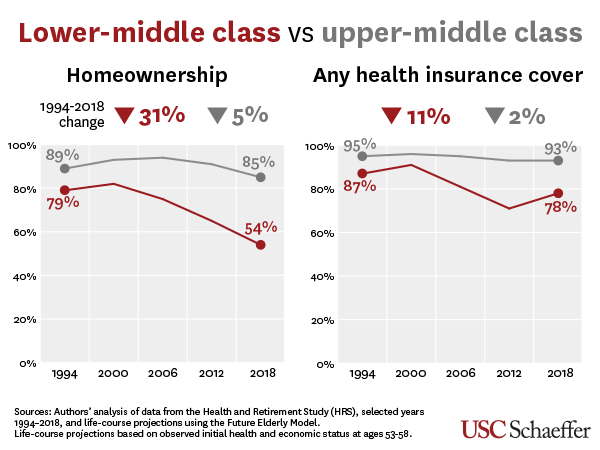Research Program
Health Policy Simulation
The Schaeffer Center’s health policy simulation work has set the gold standard for researchers to effectively model future trends in health and longevity.
Program Leadership
-

Bryan Tysinger, PhD
Director, Health Policy Simulation, USC Schaeffer Center
Senior Scholar, USC Schaeffer Institute
Research Assistant Professor, USC Price School of Public Policy
The Future Elderly Model
The pioneering Future Elderly Model (FEM) models trends in health, functional status, health spending, pharmaceutical innovation, labor supply and earnings for individuals over age 50 in the U.S. FEM has grown in reach and effectiveness from its inception in 1997 to today, assisted by funding support over the years from the Centers for Medicare & Medicaid Services, the National Institutes of Health, Pfizer and the U.S. Department of Labor. In addition, the microsimulation team has created a global network of collaborators who are building out country-level FEM-based models in 17 countries. An extension of FEM, the Future Adult Model (FAM), models similar functions for individuals ages 25 to 50.
Future Elderly Model
Future Adult Model
The Forgotten Middle: Worsening Health And Economic Trends Extend To Americans With Modest Resources Nearing Retirement
Lower-middle income Americans nearing retirement are no better off in terms of health or economic well-being than their counterparts two decades ago.
Read Full Story
Featured Research and Perspectives

Benefits of Medicare Coverage for Weight Loss Drugs
The cumulative social benefits from Medicare coverage for new obesity treatments over the next 10 years would reach almost $1 trillion, or roughly $100 billion per year.

The Burden of Cognitive Impairment
Using microsimulation, researchers estimated the burden of cognitive impairment (ADRD and/or MCI) over remaining life years above 50 overall and by disease progression, age of onset, and sociodemographic subgroups for a nationally representative sample of Americans (age≥50) with cognitive status information in the Health and Retirement Study (2000-2016).

Cost-Effectiveness Models for Alzheimer’s Disease and Related Dementias: IPECAD Modeling Workshop Cross-Comparison Challenge
Researchers established a collaboration framework to assess cost-effectiveness outcomes, an important step toward transparent and credible Alzheimer’s Disease models.

Comments in Response to a CBO Call for New Research on Obesity
While there are significant data and methodological challenges to be overcome, there are better alternatives to simplistically extrapolating from the real-world data on AOM use that is currently available.
Microsimulation Researchers
-

Dana Goldman, PhD
Director, USC Schaeffer Institute
Co-Director, USC Schaeffer Center
University Professor of Public Policy, Pharmacy, and Economics, USC
-

Duncan Ermini Leaf, PhD
Research Scientist, USC Schaeffer Center
-

Hanke Heun-Johnson, PhD
Research Scientist, USC Schaeffer Center
-

James J. Heckman, PhD
USC Presidential Scholar-in-Residence, USC Schaeffer Institute
Henry Schultz Distinguished Service Professor of Economics, University of Chicago
-

Julie Zissimopoulos, PhD
Co-Director, Aging and Cognition Program, USC Schaeffer Center
Co-Director, CeASES ADRD and AD-RCMAR
Senior Scholar, USC Schaeffer Institute
Professor, USC Sol Price School of Public Policy